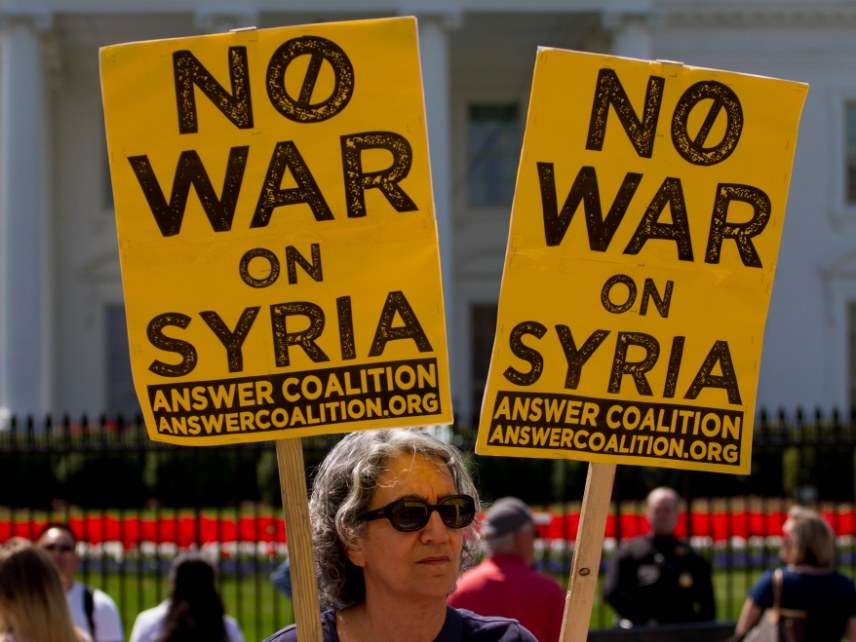Senators Respond to Trump's Unauthorized Military Strike on Syria by Trying to Give Him Even More War Powers
This new proposed bipartisan authorization seems more like a blank check for war.

No, President Donald Trump didn't have authorization to order a military strike on Syria. No, Congress will not hold him accountable for bombing Syria anyway. Not only has Congress largely abandoned its duty to grant or deny the president permission to wage war, but a bipartisan bill was introduced this week that would pretty much let him engage in war as he pleases.
Sens. Bob Corker (R-Tenn.) and former vice presidential candidate Tim Kaine (D-Va.) teamed up to introduce a new Authorization for Use of Military Force (AUMF). Both Trump and former President Barack Obama have been criticized for using the AUMF signed after 9/11, which was theoretically supposed to authorize the fight with Osama bin Laden and Al Qaeda, to justify all sorts of military interventions in the Middle East. The Obama and the Trump administrations have argued that the 2001 AUMF covers everything from military actions in Libya and Syria to drone strikes in Yemen and Somalia.
Corker and Kaine's AUMF is supposed to address this imbalance between what the 2001 bill actually authorized and how it has been used. Unfortunately, their "authorization" is virtually a blank check. It gives the president permission to keep on doing what he's doing, it expands the number of terrorist groups the White House may use the military against, and it allows the president to add both new "associated" terrorist groups to the AUMF and even entire new countries where anti-terror operations will happen, beyond Afghanistan, Syria, Iraq, Syria, Somalia, Libya, and Yemen.
In other words, it resolves the problem of unauthorized military actions by retroactively authorizing them and future strikes as well. It does not have any sunset clause, instead requiring the president to submit a report every four years with a proposal to repeal, modify, or leave the AUMF in place. There will be congressional review for the addition of new countries, and lawmakers can remove authorization to strike in new countries should they choose to do so. But otherwise this is, in practical terms, permission to send the military wherever the president pleases. (Among this new AUMF's co-sponsors, by the way, is outgoing Arizona GOP senator and Trump critic Sen. Jeff Flake.)
Gene Healy and John Glaser of the Cato Institute are not happy with this bill. They wrote a commentary for The New York Times arguing that the AUMF should instead be repealed and not replaced at all:
As we have painfully learned, war often spawns new threats. The Islamic State had its origins in the Sunni insurgency that rose to fight American forces in Iraq. As early as 2006, the National Intelligence Estimate on Trends in Global Terrorism found that the Iraq war had "become the 'cause celebre' for jihadists, breeding a deep resentment of U.S. involvement in the Muslim world and cultivating supporters for the global jihadist movement." In the seven countries that the United States either invaded or bombed since Sept. 11, the number of individual terrorist attacks rose by an astonishing 1,900 percent from 2001 to 2015. If anything, open-ended war in the Middle East has made us less safe, not more.
Presidential war undermines fundamental values of our representative democracy. "In no part of the constitution," James Madison wrote in 1793, "is more wisdom to be found than in the clause which confides the question of war or peace to the legislature, and not to the executive department"—were it otherwise, "the trust and the temptation would be too great for any one man."
Sen. Rand Paul (R-Ky.) warned on Fox News that this new AUMF will expand the president's power. This morning Sen. Mike Lee (R-Utah) tweeted that he doesn't support the new plan either:
Having reviewed the proposed bill text from my colleagues, I am not supportive of this attempt at writing a new AUMF. I look forward to seeing how the markup goes and hope for an opportunity to debate and amend something on the Senate floor.
— Mike Lee (@SenMikeLee) April 19, 2018
The White House, meanwhile, thinks it already has all the authority it needs to wage war how it chooses. It has not yet taken a formal stance one way or the other on the new AUMF.


Show Comments (38)